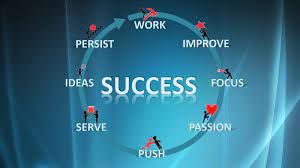Failure is often seen as a negative and undesirable outcome, associated with disappointment and setbacks. However, it is important to recognize that failure is an inevitable part of life and can serve as a powerful catalyst for personal growth, development, and success. This article explores the concept of failure and its relationship with resilience, perseverance, innovation, and learning. We will delve into famous examples of individuals and companies who experienced failure but ultimately achieved great success, examine strategies to learn from failure and transform it into a stepping stone for success, and address the psychological and emotional factors that make it difficult for people to embrace failure, and discuss how failure can be reframed as a positive and necessary experience.
What are some famous examples of individuals or companies who have experienced failure but eventually achieved great success?
Failure is often a stepping stone to success, and history is replete with examples of individuals and companies who faced initial failures but ultimately achieved remarkable success. Some notable examples include:
- Thomas Edison: Edison experienced numerous failures before inventing the practical incandescent light bulb. He famously said, “I have not failed. I’ve just found 10,000 ways that won’t work.”
- Steve Jobs: After being ousted from Apple, the company he co-founded, Jobs experienced failures with other ventures. However, he returned to Apple and played a pivotal role in transforming it into one of the most successful and innovative technology companies in the world.
- J.K. Rowling: Before the immense success of the Harry Potter series, Rowling faced rejection from multiple publishers. Her perseverance and belief in her work eventually led to one of the best-selling book franchises in history.
- Walt Disney: Disney faced bankruptcy and several business failures before the creation of Mickey Mouse and the establishment of the Walt Disney Company, which has become an entertainment empire.
These examples demonstrate that failure is not a definitive endpoint but rather a temporary setback on the journey to success.

How does failure contribute to personal growth and development?
Failure provides valuable lessons and contributes significantly to personal growth and development. When we fail, we are presented with opportunities to learn, reflect, and adapt. Some ways in which failure promotes personal growth include:
- Learning from Mistakes: Failure highlights our mistakes and helps us identify areas that need improvement. It encourages introspection, self-awareness, and the development of critical thinking skills.
- Building Resilience: Failure tests our resilience and ability to bounce back from setbacks. It strengthens our determination, perseverance, and emotional fortitude, enabling us to better navigate future challenges.
- Developing Creativity and Problem-Solving Skills: Failure often necessitates creative problem-solving. It pushes us to explore alternative approaches, think outside the box, and innovate in order to overcome obstacles.
- Encouraging Adaptability: Failure prompts us to adapt and embrace change. It fosters flexibility and the willingness to explore new strategies or paths.
By embracing failure as an opportunity for growth, individuals can develop a growth mindset that fosters continuous improvement and resilience.
What strategies can be employed to learn from failure and turn it into a stepping stone for success?

To learn from failure and transform it into a stepping stone for success, several strategies can be employed:
- Embrace a Growth Mindset: Adopt a mindset that perceives failure as a temporary setback and an opportunity to learn and grow. Emphasize effort, perseverance, and learning from mistakes.
- Reflect and Analyze: Engage in introspection and analyze the reasons for failure. Identify specific areas that require improvement and develop actionable steps to address them.
- Seek Feedback and Support: Reach out to mentors, peers, or experts who can provide objective feedback and guidance. Learn from their experiences and perspectives to gain new insights.
- Set Realistic Goals: Break down larger goals into smaller, achievable milestones. This approach allows for continuous progress, builds confidence, and reduces the fear of failure.
- Embrace Persistence and Perseverance: Failure should not deter one from pursuing goals. Maintain a resilient attitude, persevere through challenges, and use failures as motivation to keep moving forward.
By implementing these strategies, individuals can extract valuable lessons from failure and leverage them to achieve future success.
Are there any psychological or emotional factors that make it difficult for people to embrace failure as a path to success?
Several psychological and emotional factors can make it challenging for individuals to embrace failure as a path to success. These may include:
- Fear of Judgment and Rejection: The fear of being judged or rejected by others can discourage individuals from taking risks and embracing failure. The social stigma associated with failure can create a barrier to accepting it as a natural part of the learning process.
- Perfectionism: Perfectionistic tendencies can create an aversion to failure, as individuals may associate it with personal inadequacy or failure to meet high standards. The fear of making mistakes can hinder exploration and experimentation.
- Fixed Mindset: A fixed mindset, which assumes that abilities and intelligence are fixed traits, can lead individuals to view failure as evidence of their inherent limitations. This mindset hampers growth and resilience.
- Negative Self-Image: Individuals with a negative self-image may perceive failure as confirmation of their worthlessness or incompetence. This negative self-perception can undermine their confidence and ability to bounce back from setbacks.
Addressing these psychological and emotional factors requires cultivating a supportive environment that encourages risk-taking, emphasizing effort over outcomes, and promoting self-compassion and self-acceptance.
How can parents or educators encourage a healthy mindset toward failure in children?
Parents and educators play a crucial role in shaping a child’s mindset toward failure. Here are some ways they can encourage a healthy perspective:
- Normalize Failure: Help children understand that failure is a natural part of life and a stepping stone to success. Share stories of famous individuals who faced failures but eventually achieved great things.
- Encourage Risk-Taking: Foster an environment that values risk-taking and exploration. Encourage children to step out of their comfort zones, try new things, and embrace challenges.
- Focus on Effort and Growth: Praise children for their effort, resilience, and the lessons they learn from failure. Teach them that intelligence and abilities can be developed through dedication and perseverance.
- Provide Emotional Support: Be empathetic and supportive when children face failures. Help them process their emotions, express their feelings, and reframe failures as learning opportunities.
- Lead by Example: Demonstrate a healthy attitude towards failure by sharing your own experiences and how you learned and grew from them. Show children that failure is not something to be feared or avoided but embraced.
By fostering a healthy mindset towards failure, parents and educators can empower children to become resilient, adaptable, and growth-oriented individuals.

What are some common misconceptions about failure and success?
Misconceptions about failure and success can hinder personal growth and discourage individuals from taking risks. Some common misconceptions include:
- Failure is Final: Failure is often seen as a permanent setback rather than a temporary learning experience. This misconception can discourage individuals from pursuing their goals and hinder personal development.
- Success Comes Easily: Success is often portrayed as an effortless achievement. In reality, it is often the result of perseverance, hard work, and learning from failure. Recognizing the effort behind success helps dispel the misconception that success is instantaneous or easy to attain.
- Failure Equals Incompetence: Failure is frequently equated with incompetence or lack of ability. This misconception overlooks the complex nature of success and the valuable lessons that failure can provide.
- Risk Avoidance Guarantees Success: Some believe that avoiding risks and staying within one’s comfort zone ensures success. However, true growth and success often require taking calculated risks, embracing challenges, and learning from failures.
By dispelling these misconceptions and promoting a realistic understanding of failure and success, individuals can cultivate a healthier mindset and approach toward their goals.
How does failure foster resilience and perseverance in individuals?
Failure is a powerful catalyst for building resilience and perseverance in individuals. When faced with failure, individuals are forced to confront setbacks, overcome obstacles, and adapt to new circumstances. Here’s how failure fosters resilience and perseverance:
- Building Mental Strength: Failure challenges individuals to develop mental fortitude and resilience. It strengthens their ability to cope with adversity, bounce back from setbacks, and remain focused on their goals.
- Encouraging Problem-Solving Skills: Failure prompts individuals to reevaluate their strategies and find alternative solutions. This process cultivates problem-solving skills and encourages a proactive and persistent approach to challenges.
- Nurturing Determination: Failure tests an individual’s determination and commitment to their goals. It fosters a sense of purpose and the drive to overcome obstacles, motivating individuals to persist even in the face of adversity.
- Developing Adaptability: Failure necessitates adaptability and flexibility. Individuals learn to adjust their strategies, explore new possibilities, and embrace change to overcome obstacles and achieve their objectives.
Through these experiences, failure becomes a catalyst for personal growth, instilling resilience and perseverance in individuals as they continue to pursue their aspirations.

